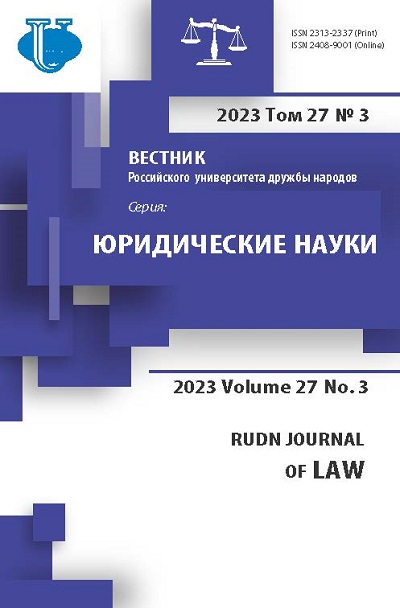Modeling approaches to AI integration into public relations in Russia as per comparative research of foreign countries’ experience
- Authors: Atabekov A.R.1
-
Affiliations:
- RUDN University
- Issue: Vol 27, No 3 (2023)
- Pages: 686-699
- Section: ADMINISTRATIVE AND FINANCIAL LAW
- URL: https://journals.rudn.ru/law/article/view/36138
- DOI: https://doi.org/10.22363/2313-2337-2023-27-3-686-699
- EDN: https://elibrary.ru/HGRUOL
- ID: 36138
Cite item
Abstract
Artificial intelligence (AI) technologies are one of the most significant solutions that can fundamentally change both public relations and the sphere of public legal relations. The goal of the present research is to conduct a comparative analysis of existing approaches to the AI integration into the sphere of public legal relations of foreign countries and Russia, with the subsequent determination of the most effective constructive approaches to the formation of a regulatory policy regarding AI in Russia. This goal is achieved through the study of the following issues: Strategic goal-setting in relation to AI in Russia and other countries; Tactical implementation of AI integration into public legal relations and possible solutions in order to ensure AI decision-making transparency; Model compensatory measures that ensure AI safe integration into public relations in Russia. The object of the study comprises regulatory sources, strategies, and other documents regulating the AI integration into the sphere of public legal relations in Russia and foreign countries, judicial practice examples, and academic publications on the issues under study. The research methodology incorporates a complex of modern philosophical, general scientific, special scientific methods of cognition, including dialectical, systemic, structural-functional, hermeneutic, comparative legal, formal legal (dogmatic), legal modeling methods, and some others. The present research lays special emphasis on the implementation of a comparative legal study of the approaches to and regulation of AI in the public sphere regarding various states experience. The general scientific dialectical method has made it possible to consider the AI position in the legal field from the point of view of the AI regulation variability and trends in the subsequent development thereof, and to substantiate the advantages and disadvantages of various approaches to solve the respective issues, as well. Additional emphasis is also laid on addressing the issues of the applied nature of the AI use in the field of public relations in Russia, taking into account the legal modeling and development of compensatory measures within the authorities’ regulatory approaches.
About the authors
Atabek R. Atabekov
RUDN University
Author for correspondence.
Email: atabekov-ar@rudn.ru
ORCID iD: 0000-0002-1456-7409
SPIN-code: 5254-5460
Candidate of Economics, Associate Professor of the Department of Administrative and Financial Law, Law Institute
6 Miklukho-Maklaya str., Moscow, 117198, Russia FederationReferences
- Bryson, J. J., Diamantis, M. E. & Grant, T.D. (2017) Of, for, and by the people: the legal lacuna of synthetic persons. Artificial Intelligence and Law. (25), 273-291. https://doi.org/10.1007/s10506-017-9214-9
- Burrell, J. (2016) How the machine ‘thinks’: Understanding opacity in machine learning algorithms. Big data & society. 3(1), 205395171562251. https://doi.org/10.1177/2053951715622512
- Chopra, S., & White, L. (2004) Artificial agents-personhood in law and philosophy. In: Proceedings of 16th European conference on artificial intelligence, ECAI 2004. IOS Press. pp. 635-639.
- Cui, Y. (2020) Artificial intelligence and judicial modernization. Springer Singapore, Shanghai People's Publishing House. https://doi.org/10.1007/978-981-32-9880-4
- Grey, C. & Costas, J. (2016) Secrecy at work: The hidden architecture of organizational life. Stanford, California, Stanford University Press.
- Lewis, D.K. (1973) Counterfactuals. Cambridge, Harvard University Press.
- Liu, F. & Shi, Y. (2020) Investigating laws of intelligence based on AI IQ Research. Ann. Data. Sci. (7), 399-416. https://doi.org/10.1007/s40745-020-00285-x
- Marchenko, A.Yu. (2022) Legal analysis of the latest EU legislation on the use of artificial intelligence technologies: diss. …of cand. of legal of sciences. Moscow, Moscow State Institute of International Relations (University) of the Ministry of Foreign Affairs of the Russian Federation. (in Russian).
- Martynov, A.V. & Bundin, M.V. (2020) On the legal principles of the use of artificial intelligence in the implementation of control and supervisory activities by executive authorities. Journal of Russian Law. (10), 59-75. https://doi.org/10.12737/jrl.2020.120.59-75 (in Russian).
- Misuraca, G. & van Noordt, C. (2020) Overview of the use and impact of AI in public services in the EU. EUR 30255 EN. Publications Office of the European Union, Luxembourg. https://doi.org/10.2760/039619
- Momotov, V.V. (2021) Artificial intelligence in litigation: state and prospects for use. Courier of Kutafin Moscow State Law University (MSAL)). 5(81), 188-191. https://doi.org/10.17803/2311-5998.2021.81.5.188-191 (in Russian).
- Morhat, P.M. (2018) Legal personality of artificial intelligence in the field of intellectual property law: civil law problems: diss. ... Doctor of legal sciences. Moscow, Russian State Academy of Intellectual Property. (in Russian).
- Niklas, J., Sztandar-Sztanderska, K. & Szymielewicz, K. (2015) Profiling the unemployed in Poland: Social and political implications of algorithmic decision-making. Warsaw, Creative Commons Attribution 4.0 International (CC BY 4.0). Available at: https://panoptykon.org/sites/default/files/leadimage-biblioteka/panoptykon_profiling_report_ final.pdf. [Accessed 20th January 2022].
- Ponkin, I.V. & Redkina, A.I. (2018) Artificial intelligence from the point of view of law. RUDN Journal of Law. 22(1), 91-109. https://doi.org/10.22363/2313-2337-2018-22-1-91-109 (in Russian).
- Scherer, M.U. (2016) Regulating artificial intelligence systems: Risks, challenges, competencies, and strategies. Harvard Journal of Law & Technology. 29(2), 353-400.
- Shchitova, A.A. (2022) Legal regulation of information relations on the use of artificial intelligence systems: diss. …of cand. of legal of sciences. Moscow, Moscow State Law University named after O.E. Kutafin (MSUA). (in Russian).
- Xu, A. (2017) Chinese judicial justice on the cloud: a future call or a Pandora’s box? An analysis of the ‘intelligent court system’of China. Information & Communications Technology Law. 26(1), 59-71. https://doi.org/10.1080/13600834.2017.1269873
- Yastrebov, O.A. (2018a) Artificial intelligence in the legal space. RUDN Journal of Law. 22(3), 315-328. https://doi.org/10.22363/2313-2337-2018-22-3-315-328 (in Russian).
- Yastrebov, O.A. (2018b) Legal personality of electronic person: theoretical and methodological approaches. Proceedings of the Institute of State and Law of the Russian Academy of Sciences. 13(2), 36-55. (in Russian).
- Zhang, Z., Zhang, J. & Tan, T. (2021) Analysis and Strategy of AI Ethical Problems. Bulletin of Chinese Academy of Sciences (Chinese Version). 36(11), 1270-1277. https://doi.org/10.16418/j.issn.1000-3045.20210604002
Supplementary files















